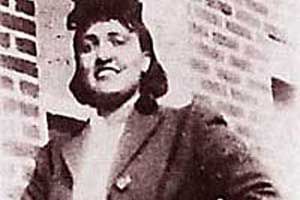 Henrietta Lacks circa 1945
Henrietta Lacks circa 1945
HeLa cells (not to be confused with the scientific prefix hella) were the first immortal cells ever discovered. Unlike typical cells that die after a certain number of divisions (known as the Hayflick limit), HeLa cells can divide an unlimited number of times as long as there is enough nutrition for the cells. For microbiologists, this was a huge boon, cells could simply be centrally manufactured and shipped to labs across the world. The result of research on HeLa cells: the polio vacinne, in vitro fertilization, and even the basics of gene mapping.
HeLa cells were obviously a tremendous gift to science, but an investigation into their history brings to light a more compelling tale. HeLa cells were named after the woman they wee taken from: Henrietta Lacks. Henrietta was a poor, African American woman who happened to be treated for cervical cancer at Johns Hopkins University, one of the premier medical research hospitals in the world. Before she passed away, a sample of her cervical cells were taken without her consent, as was the standard practice at the time. Fast forward almost thirty years, her family were largely unaware of the HeLa cell line. This line had been multiplied and sold for millions over that time, yet the destitute family never profited. No scientist had really ever explained to the under-educated family what a cell even looks like.
Enter author and science writer Rebecca Skloot. She just published her 1st book, the Immortal Life of Henrietta Lacks, now a New York times Bestseller. She spent 10 years researching, breaking barriers, and fighting to tell Henrietta's tale. I just read the book as part of the Down to a Science book club, I thought it was an eye opening discussion of science, ethics, race, and class. In fact, I found Rebecca's years of frustration trying to break through to the family the most compelling parts of the book. The overt distrust of science, particularly of medicine, seems an appropriate tale in these tough times for science communication.
She will be in the Bay Area the last week of April to discuss the book. Below are her local appearances:
Dr. Kiki's Science Hour
When: Thursday, April 22nd, 3-4 PM
Details: Local science personality Kirsten Sanford will interview Rebecca on her weekly science program.
Book Passage Cafe
When: Sunday, April 25th, 2-4 PM
Where: Corte Madera
Details: Rebecca will give a short talk with a book signing to follow.
